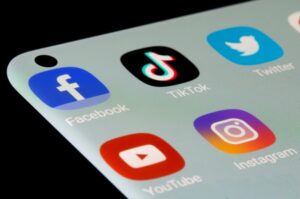As social media CEOs descend on Washington, D.C. under pressure recently, Florida Attorney General Ashley Moody called on Congress to push child-safety initiatives on the platforms.
The U.S. Senate Judiciary Committee held a hearing entitled “Big Tech and the Online Child Sexual Exploitation Crisis,” where witnesses included X Corp. CEO Linda Yaccarino, TikTok CEO Shou Chew, Snap Inc. CEO Evan Spiegel, Discord Inc. CEO Jason Citron and Meta CEO Mark Zuckerberg.
 “Big Tech CEOs think they are untouchable, and they have had free rein over our children online for way too long,” Attorney General Ashley Moody said. “Florida is taking action, but we need Congress to hold these companies that target our kids accountable for the problems they have created.”
“Big Tech CEOs think they are untouchable, and they have had free rein over our children online for way too long,” Attorney General Ashley Moody said. “Florida is taking action, but we need Congress to hold these companies that target our kids accountable for the problems they have created.”
Attorney General Moody said her office continues to fight to protect children online. The Florida House of Representatives voted to pass House Bill 1 to protect children from addictive social media platforms and the danger they pose to mental health.
Most recently, Attorney General Moody took legal action against Meta—alleging that the company knowingly designed and deployed harmful features on Instagram and its other social media platforms that purposefully aim to addict children and teens. The complaint alleges that Meta knew of the harmful effects of its platforms, including Facebook and Instagram, on young people. Instead of taking meaningful steps to mitigate these harms, Meta misled the public about the effects associated with use of its platform. The company deceived users of the extent of the psychological and health impacts suffered by young users addicted to use of its platforms. The complaint further alleges that Meta knew that young users, including those under 13, were active on the platforms and knowingly collected data from these users without parental consent.
To view Florida’s civil action, click here.
Last July, Attorney General Moody invited Meta CEO Mark Zuckerberg to testify before the Statewide Council on Human Trafficking about the results of a concerning Florida human trafficking survey. Attorney General Moody and the council conducted a statewide study with Florida law enforcement agencies on documented instances since 2019 in which social media was used to facilitate human trafficking, trafficking operations or control victims. The survey went out to 80 law enforcement agencies, going to all 67 sheriffs’ offices and police departments in major Florida cities. Results show that 146 of the 271 reported instances of social media platform use in human trafficking are attributable to Meta platforms—more than half of the reported instances involved.
Since then, Meta made minor changes to enhance youth protections, including a new “nightly nudges” setting that prompts users to put Instagram or Facebook away for the night. However, the setting is not compulsory, and Meta has yet to respond to Florida’s allegations.
Early last year, Attorney General Moody warned parents about the harm and danger associated with TikTok, saying: “As a mom, an American and Florida’s Attorney General, I have major concerns about how TikTok may be influencing children and exploiting user data. As my attorneys—along with federal officials—continue to investigate TikTok, I recommend parents consider deleting the app from their children’s devices to protect the security of their personal information.”
In March 2022, Attorney General Moody and a bipartisan coalition of 43 attorneys general demanded TikTok and Snapchat give parents the ability to monitor a child’s social media usage to protect children from online threats using parental-control applications and features.
Research increasingly demonstrates the negative impact that social media can have on the physical, emotional and mental well-being of children and teenagers. Negative effects range from decreased self-esteem and greater body-image dissatisfaction to increased exposure to cyberbullying and sexual predation. One app reported that, in 2021, it analyzed more than 3.4 billion messages and found:
- 43.09% of tweens and 74.61% of teens were involved in a self-harm or suicidal situation;
- 68.97% of tweens and 90.73% of teens encountered nudity or content of a sexual nature;
- 75.35% of tweens and 93.31% of teens engaged in conversations surrounding drugs and alcohol;
- 80.82% of tweens and 94.50% of teens expressed or experienced violent subject matters or thoughts; and
- 72.09% of tweens and 85.00% of teens experienced bullying as a bully, victim or witness.
Social media platforms already operate under some community guidelines, but these are not always sufficient to protect children and teenagers who are particularly vulnerable to online threats—especially with regard to direct messaging. Some parental-control apps empower parents to better protect their children and maintain a safe space online.
To read the full bipartisan letter, click here.


